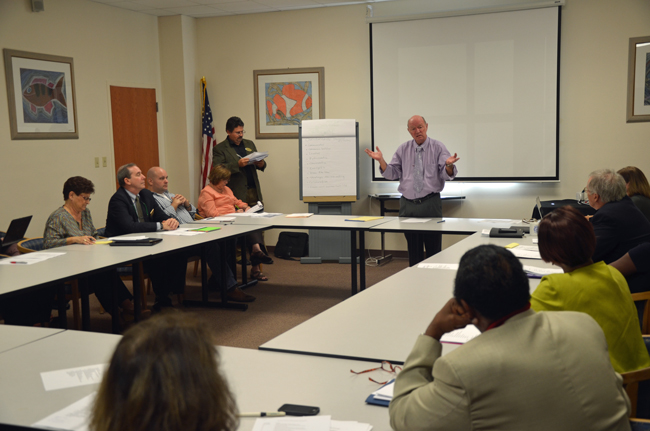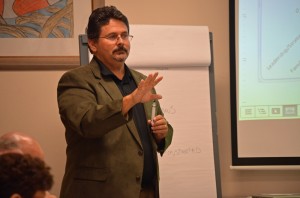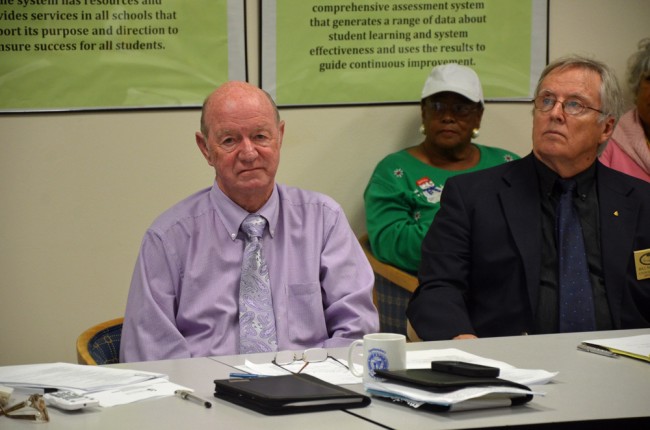
If there was any doubt left that the Flagler County School Board intends to leave little to chance as it steers its way to the appointment of Jacob Oliva as its next superintendent, that doubt was dispelled Tuesday afternoon when the board’s 15-member search committee met for the first time.
There was a surprise, unofficial 16th member to that committee: Jerry Copeland.
Copeland was never mentioned before as the board drew up its committee members, with each board member appointing three people to the committee. Board members didn’t appoint him. He was there at the behest of Janet Valentine, the current superintendent, and to some extent at that of Oliva, the acting superintendent, to help lead the committee’s discussions as it draws up a job description and list of criteria it wishes to see in its next superintendent.
Few members of the committee know Copeland. For the past several years he’s been the district’s hired hand and lead negotiator in collective-bargaining sessions with the local teachers union. He says he’s volunteering his service for the search committee, though the district paid his firm $24,600 for just five months’ consulting work between July and November, according to the district’s financial records. More recent bills aren’t in yet. The superintendent search itself has a $5,000 spending cap, much of it earmarked for advertising the position.
Copeland’s presence before the committee was no coincidence. He knows the school district intimately. More to the point: Copland has first-hand familiarity with Oliva. Copland and Oliva are on the same collective-bargaining team. They meet and talk strategy often (and have a meeting this week). When it comes to union negotiations and strategy, they’re colleagues. Copland knows Oliva’s qualities, his character and his leadership abilities. He revealed none of that relationship at today’s meeting describing himself only as the president of a consultancy that helps many school districts with negotiations and other needs.
Copland’s skill as a negotiator in collective-bargaining sessions is to lead (or hew) to pre-determined conclusions, and waver from those conclusions as little as possible. Ahead of those sessions, he gets his orders from the school board and the top administration—including Oliva—and sets to work implementing the orders with disarming effectiveness. As a negotiator in Florida he has few equals, and often bests his opposition. He manipulates with a velvet glove, though he’s been known to put on an iron fist on occasion.
He put his velvety skills to work Tuesday as he dominated a considerable portion of the meeting with leading questions that sought the sort of answers that went into building the job criteria of the next superintendent. Those criteria will frame discussions to come. They so happened to draw a pretty accurate portrait of Oliva, whom few committee members know directly.
“As we think about building these personal attributes, would you agree—and you’re welcome to disagree with me—but would you agree that it’s important that somebody understand, has a working, knowledge level, the Florida educational finance program?” Copland asked. No one disagreed. Oliva has been immersed in those programs.
The candidate should have “a feeling for what constitutes the body politic,” Copland continued, meaning how the organization fits with the community. “That is best accomplished when an individual exercises with pure excellence interpersonal skills,” Copland said. Committee members agreed. That, too, describes Oliva. It describes very many other potential candidates as well, but not candidates who have applied those skills in this community.
As he went on, Copland made fewer and fewer pretenses of objectivity. “Another thing, which I think is critical, and I’m going to try to influence you again now, they need to understand what systems science is,” he said of the next superintendent. He explained the terms—systems science—as the mechanism that runs the system at every level. Who but Oliva has been at those many levels in the past several years, at least in this system?

Finally, Copland abandoned all pretenses when he suggested that one of the job criteria should be that the candidate has at least 10 years’ experience that includes some teaching,. “some school based experience that is very close to the community,” and some executive, administrative experience. He might as well have been reading from Oliva’s Facebook About page (if Oliva had such a page): Oliva began his teaching career at Wadsworth Elementary, he was the principal of Flagler Palm Coast High School, the district’s largest, school, and was elevated to assistant superintendent last year.
Copland said the search committee might expect from 70 to 140 applicants. But unless other Flagler district administrators throw their name in the ring—and none is likely to be that foolish, knowing who’ll soon be boss—none of those applicants will have secured the full complement of criteria Copeland got the search committee to wholeheartedly endorse.
That, too, is one of Copeland’s strengths as a negotiator: he can make his target audience believe that the conclusions are theirs, rather than his.
On Thursday, Copeland said, he will talk about the criteria used in selecting applicants after the committee has settled on their personal attributes. He was signaling, in other words, to what extent he would be setting the agenda.
As Copeland talked, School Board Chairman Andy Dance—another non-member of the committee who is nevertheless playing an integral role in the committee’s process—took notes on a hand-held pad or on a poster board that Thursday will be synthesized into the job description and want ad to be disseminated to certain trade publications. And after the meeting, Dance and Copeland had a meeting of their own behind closed doors.
Only after Copeland was done talking to the committee did the group, as if in an afterthought, take up the matter of appointing a chairperson—whose role it normally would have been to steer discussions, independently of ringers like Copeland. That role went unanimously to Barbara Revels, the county commissioner who also chairs the county’s economic development council, and who led that council through reams of job applicants and the decision to hire Helga van Eckert as the county’s economic development director two years ago. Revels and the eight members of her council enjoyed full independence as they narrowed down and interviewed candidates, more than a dozen of them by phone, before inviting them for in-person interviews.
“I don’t sit in school board meetings and I don’t converse with them individually, so other than what I might read in the press, that includes all forms, I don’t know that they have pre-determined” their choice, Revels said of school board members. “I do believe that they have, from statements that I’ve read, they have great confidence in [Oliva], and that he has been a wonderful person to fall back on at a very, very tough time for them.” Oliva took over the district’s leadership seamlessly when Valentine suffered a stroke just before Thanksgiving. Oliva remains in charge.
“So that being said, I understand somebody already being in a position, wanting that position, and the board looking at that person saying, they’ve got all the capabilities and have demonstrated that. But what else is out there? And I think that you could hear from the committee members today that everybody just wants to look at all comers, and what are their credentials, and I’m sure that the school board would hope that when Jacob is measured against the top two or three or five or seven or whatever it ends up being, that he’ll stand out, and that’s his case to make.”
The committee members have nothing clubbish about them: many don’t know each other, most spoke Tuesday, independently and candidly, taking the job seriously and with little heed to notions of a pre-determined outcome. But they also are aware that whatever names they recommend—and Oliva’s presence at least among those names is a foregone conclusion few would dispute—the school board will decide how many individuals to interview, and of course who to appoint in early February.
“I don’t want to waste my time,” Bill McGuire, another member of the committee and a Palm Coast City Council member, said. “I don’t think it is pre-determined. I think there’s enough open minds sitting in that room there that the best can and will be chosen.” McGuire was familiar with Copeland, having seen him in action during bargaining sessions, which McGuire attends as the tea party’s liaison with the school board. He continued: “I am sitting here listening to people that appear to me open minded, intelligent people, capable of making their own decisions, and none of them will face any backlash from it. The only ones likely to get any flack from it are people like me and Barbara Revels.”
Board Attorney Kristy Gavin had started today’s session by giving committee members a primer on the Sunshine Law: none of the members is allowed to have private conversations relating to the superintendent search with other members of the committee. The members may not use various schemes to get around the law—such as using someone who is not on the committee as a go-between with other members of the committee, or using Facebook or other social media mechanisms to exchange ideas, even second or third hand, with other members of the committee. The meetings themselves must be advertised and held in the open.
Administrative staff, however, is not subject to the same standards: staff members are allowed to speak with each other freely or with committee members, though almost all records—and all records relating to the superintendent’s search, from presentations to notes taken during the committee meetings to emails about the search on committee members’ private email accounts—are subject to the public record law: anyone may request those records, which must be turned over (though the district may charge 15 cents a page to copy them, if the records are not electronic). Violations may result in $500 fines, 60 days in jail and attorneys’ fees.
“Now that you all know that, I really thank you for your time here,” Dance told the group.
One of the launching points of the discussion about the job description was the online community survey the school district conducted, asking participants to list their top five criteria from a list provided them. Only 168 people participated (several of them members of the committee), which disappointed committee members and diminished the survey’s influence. Those criteria will be solidified in Thursday’s meeting, at 4 p.m. in the third-floor superintendent’[s conference room at the Government Services Building.
Committee members and a few staffers aside, today’s meeting was lightly attended. It included a portion at the end for public comment. Sims Jones, a Palm Coast resident and Bunnell pastor who had wanted to be on the committee, spoke critically of the survey.
“To me it doesn’t look like there was too much outreach to the community,” he said, citing the numerous places where it could have been distributed. “The ball was really dropped. The community really didn’t get informed to put their thing in, because the community wasn’t reached. Just telling people to go to the school website is futile.”
![]()






























Mike says
ITs the FCSB dog & pony show, give Olivia the job stop wasting our time and money for a decission that is already made, but people of Flagler if you expect change you nee to vote out the current board starting with Mr. Dance.
Rob says
Can I say ” I told you so” ?
https://flaglerlive.com/61663/jacob-oliva-appointment/comment-page-1/#comment-731766
If what Mr McQuire says is true “I am sitting here listening to people that appear to me open minded, intelligent people, capable of making their own decisions,” why is there a need for a cheerleader?
Wikidepdia says this about a ringer or confederate.
A shill, also called a plant or a stooge, is a person who publicly helps a person or organization without disclosing that they have a close relationship with the person or organization.
Charles Gardner says
Once again I just could not bring myself to click on the image for a larger view.
Marissa says
Can you imagine, 100 to 150 candidates they say may apply. What! Please child, stop the smoke and mirrors already. I’m sure there has to be a couple of applicants that meet or surpass Oliva’s qualifications all for naught. Give Oliva the job and save the taxpayers the $5,000. Oh, I forgot, you have to advertise for EEOC.
Janet says
Sad to see you and Annie were not in attendance at the 2nd meeting on Thursday. There were some tid bits you missed…
There were lively and intelligent suggestions and discussion around wordsmithing the qualities to be included in the advertisement to be written and voted on by the Board at the Tuesday, Dec.17 meeting, since the breathless pace of this search requires a 30 day advertisement cycle. The HR dept then culls a pile of applications that make the stated job description criteria cut to be sent on to the community panel for consideration for final Board review. The consultant or the Board (unclear who) will create the rubric for the community committee to judge the applicants, in an effort to narrow the field to a handful from which the Board will make the final decision.
The breakneck pace is apparently driven by the “must attend” Superintendent Training to be held in Tally in February, and Ms Valentine said it would be very important to have the new supt. selected by then, so “that person could have the advantage that she didn’t have.”
The one big ‘ah-ha’ that was disclosed by Mr. Copeland today is that the “must attend” superintendent training that is driving the ramped up timetable is for CURRENT SUPERINTENDENTS WHO ARE NEEDING TO RENEW THEIR CREDENTIALS….it is NOT for new superintendents! He trains new superintendents via a 2 year program or in person as they acclimate to the job responsibilities at their best learning pace, not via the refresher that is held in February.
So does this mean that the apparent rush to select someone quickly solely by Board directed particulars is unnecessary? Could the Board take a more thorough needs assessment of the district’s top 5 areas of need to clarify what specific experience is critical for the candidates to possess? This could possibly give the panel a better target to create a better advertisement and then be able to assess the relative experience and success the candidates might bring to FCS. Mr. Winston attempted several times to include a demonstrated experience qualifier that has been an historic need in FCS. Yet the global, feel good qualities of the sample list were selected because they align to the sound bites from the ‘premier school district’ vision statement.
Does the Board have a rubric for what ‘premier’ means, or looks like, or how it can be quantified? How far from premier are we? What level is FCS now? What are the current top 5 needs of FCS? How big a job are we asking someone to do for $125K? How many years will we ‘give’ the new superintendent to get FCS to ‘”premier” status?
The panel is a group of thoughtful community volunteers who are passionate about contributing to the process of selecting the best superintendent candidate charged with improving FCS for the benefit of the students and the community. Let’s respect their time and considerable efforts by providing adequate timelines ( Mr. Copeland mentioned typical range of 6-9 months minimum) for intelligent review.
The Board would do all in FC a huge service to allow this process the respectable time it deserves. This is NOT a crisis that is too good to waste, yet the bogus ‘rush to make the training’ is a false requirement and best to put aside.
FC is a district that deserves appropriate focus and reflection to make the BEST superintendent selection in order to address the issues that remain in a good district….on its way to ‘premier.’